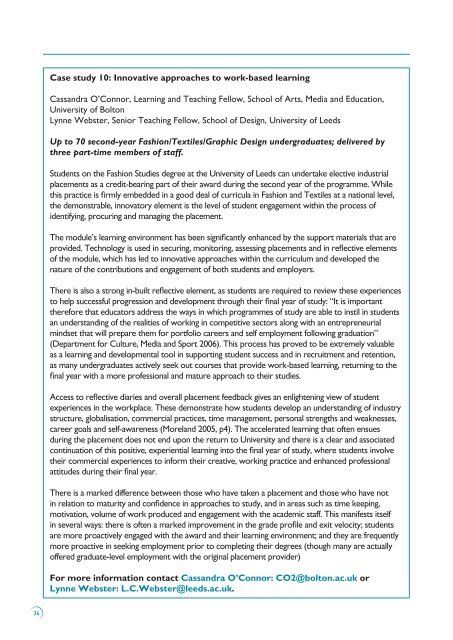Pedagogy for employability - Higher Education Academy
Pedagogy for employability - Higher Education Academy
Pedagogy for employability - Higher Education Academy
You also want an ePaper? Increase the reach of your titles
YUMPU automatically turns print PDFs into web optimized ePapers that Google loves.
Case study 10: Innovative approaches to work-based learning<br />
Cassandra O’Connor, Learning and Teaching Fellow, School of Arts, Media and <strong>Education</strong>,<br />
University of Bolton<br />
Lynne Webster, Senior Teaching Fellow, School of Design, University of Leeds<br />
Up to 70 second-year Fashion/Textiles/Graphic Design undergraduates; delivered by<br />
three part-time members of staff.<br />
Students on the Fashion Studies degree at the University of Leeds can undertake elective industrial<br />
placements as a credit-bearing part of their award during the second year of the programme. While<br />
this practice is firmly embedded in a good deal of curricula in Fashion and Textiles at a national level,<br />
the demonstrable, innovatory element is the level of student engagement within the process of<br />
identifying, procuring and managing the placement.<br />
The module’s learning environment has been significantly enhanced by the support materials that are<br />
provided. Technology is used in securing, monitoring, assessing placements and in reflective elements<br />
of the module, which has led to innovative approaches within the curriculum and developed the<br />
nature of the contributions and engagement of both students and employers.<br />
There is also a strong in-built reflective element, as students are required to review these experiences<br />
to help successful progression and development through their final year of study: “It is important<br />
there<strong>for</strong>e that educators address the ways in which programmes of study are able to instil in students<br />
an understanding of the realities of working in competitive sectors along with an entrepreneurial<br />
mindset that will prepare them <strong>for</strong> portfolio careers and self employment following graduation”<br />
(Department <strong>for</strong> Culture, Media and Sport 2006). This process has proved to be extremely valuable<br />
as a learning and developmental tool in supporting student success and in recruitment and retention,<br />
as many undergraduates actively seek out courses that provide work-based learning, returning to the<br />
final year with a more professional and mature approach to their studies.<br />
Access to reflective diaries and overall placement feedback gives an enlightening view of student<br />
experiences in the workplace. These demonstrate how students develop an understanding of industry<br />
structure, globalisation, commercial practices, time management, personal strengths and weaknesses,<br />
career goals and self-awareness (Moreland 2005, p4). The accelerated learning that often ensues<br />
during the placement does not end upon the return to University and there is a clear and associated<br />
continuation of this positive, experiential learning into the final year of study, where students involve<br />
their commercial experiences to in<strong>for</strong>m their creative, working practice and enhanced professional<br />
attitudes during their final year.<br />
There is a marked difference between those who have taken a placement and those who have not<br />
in relation to maturity and confidence in approaches to study, and in areas such as time keeping,<br />
motivation, volume of work produced and engagement with the academic staff. This manifests itself<br />
in several ways: there is often a marked improvement in the grade profile and exit velocity; students<br />
are more proactively engaged with the award and their learning environment; and they are frequently<br />
more proactive in seeking employment prior to completing their degrees (though many are actually<br />
offered graduate-level employment with the original placement provider)<br />
For more in<strong>for</strong>mation contact Cassandra O’Connor: CO2@bolton.ac.uk or<br />
Lynne Webster: L.C.Webster@leeds.ac.uk.<br />
36

















